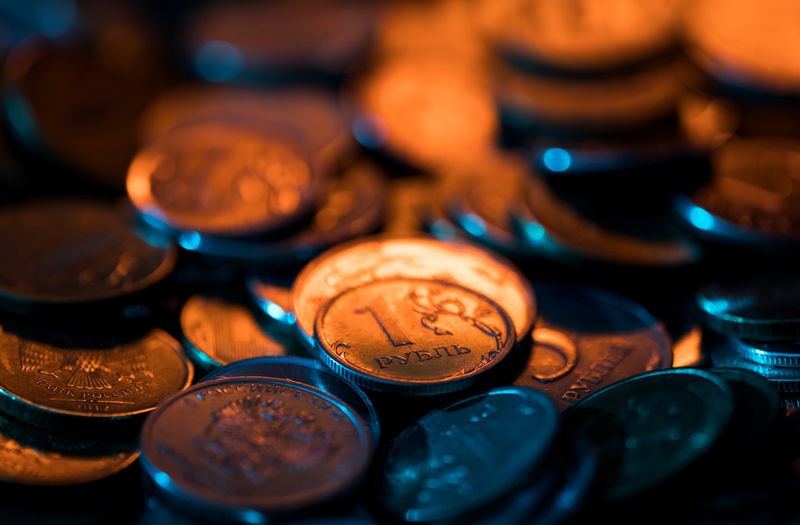(Reuters) -The rouble firmed past 90 against the dollar in Moscow trade on Monday, a near one-month high, while Russian stocks extended their slide lower on the third session of trading after an almost month-long suspension.
The Russian market is gradually reopening after a suspension caused by sweeping Western sanctions that followed the beginning of what Russia calls "a special operation" in Ukraine on Feb. 24.
Russian stocks and bonds resumed trading in full on Monday, albeit for a curtailed timeframe and with various restrictions, including a ban on short-selling, still in place. Non-residents are barred from selling stocks and OFZ rouble bonds until April 1.
By 1530 GMT, the rouble gained 7.7% to 89.10 to the dollar, its strongest level since March 1.
The rouble has gained support from conditions of continuing capital controls and the absence of serious sanctions tightening, said Dmitry Polevoy, head of investment at Locko-Invest.
But the rouble was weaker on the EBS electronic platform, hovering at 96 to the dollar.
The rouble had gained 7.1% to trade at 98 versus the euro, a one-month high.
Investors are watching the outcome of peace talks between Russia and Ukraine that may get under way in Turkey on Tuesday.
STOCKS STRUGGLE
Equities largely lost ground, with flag carrier Aeroflot a notable exception, recovering to gain 5% after touching its lowest since 2009 in early trade.
The rouble-based MOEX Russian index was 1.9% lower at 2,436.0 points. The dollar-denominated RTS index was down 0.9% to 822.4 points.
The Russian government has promised to support Russian companies by buying their stocks with money channelled from the rainy-day National Wealth Fund.
As of Monday, Russia has not started spending the fund's money on stocks purchases, Finance Minister Anton Siluanov said, according to Interfax.
Trading in depositary receipts in Russia remained suspended. Finam brokerage said in a note that the stock market's slide was continuing in the absence of any growth drivers.
Dominant lender Sberbank shed 3.9%, gas giant Gazprom (MCX:GAZP) fell 3.6% and oil major Rosneft slid 1.9%.
Yields on Russia's benchmark 10-year OFZ treasury bonds were at 13.62%, down from last week's record high of 19.74%, which is just below the central bank's key interest rate, but still at levels last seen in March 2015.

Yields move inversely to prices.
Russia has demonstrated that it can continue to service foreign currency debt in recent weeks, but that ability will be tested once more on Monday, with Russia scheduled to pay a $102 million coupon on a Eurobond due in 2035.